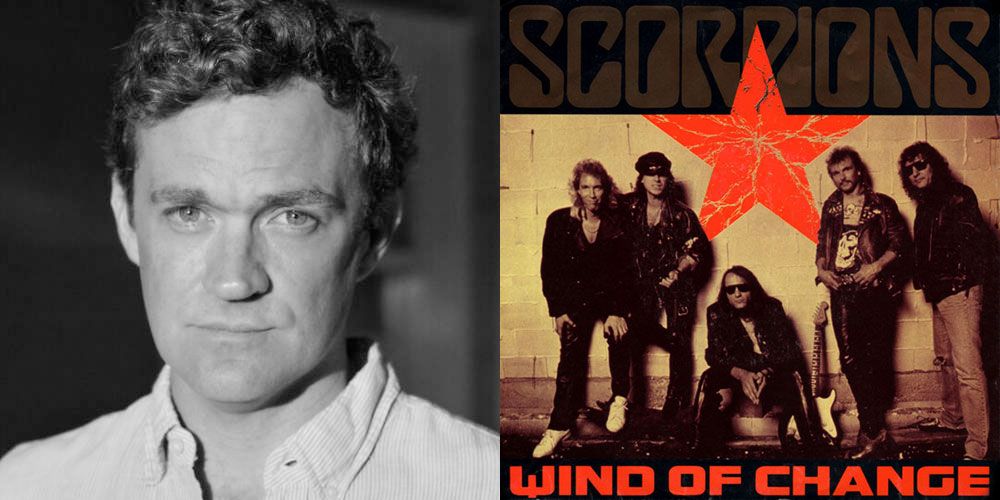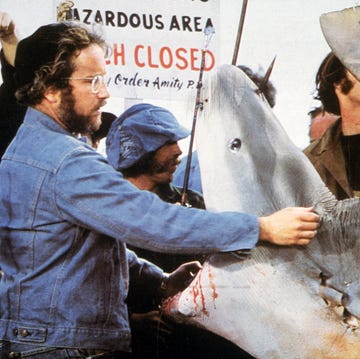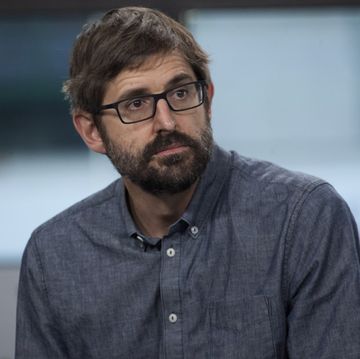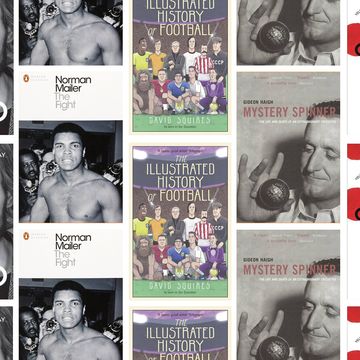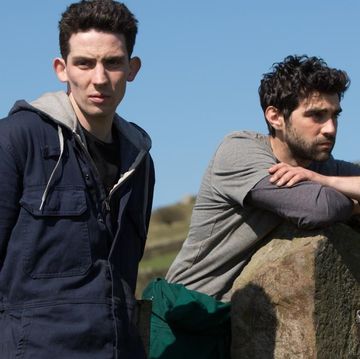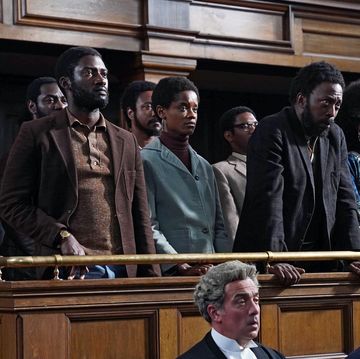If Tiger King was the must-see TV show for the start of lockdown, so Wind of Change has become the must-hear podcast as we (slowly) approach the other side. Both are detective stories featuring a larger-than-life cast of characters bought together by somewhat kitsch protagonists, who may or may not be hiding an explosive secret.
The big difference, however, is that Wind of Change is written and presented by Patrick Radden Keefe, long-serving New Yorker staff writer, investigative journalist and award-winning author, whose most recent book Say Nothing: The True Story of Murder And Memory in Northern Ireland, won the 2019 Orwell Prize for Political Writing, among others. His next, due out next year, concerns America’s opioid crisis, and the role the Sackler family and their company Purdue Pharma played in it.
Wind of Change tells a rather different story, one its author had been unable to get out of his head since he heard it from a creditable source ten years ago. It asks: did the CIA write ‘Wind of Change’, the cheesy Eighties power ballad by German hair band The Scorpions, as propaganda to help bring about the end of the Cold War? A delicious notion, but arguably not the most outlandish story uncovered over eight riveting episodes, a project that variously draws in the Kremlin, Mötley Crüe, George H W Bush, Nina Simone, an action figure convention, several ex-spies and the CIA today.
Congratulations on the success of the podcast. What’s happened since?
I’m getting a lot more email. I think I intuited that probably people would listen and pick up different parts of the story that they were interested in and develop theories of their own. I may have underestimated the extent to which they would look me up and get in touch and lay out those theories in elaborate detail.
You're a highly respected, award-winning investigative journalist and New York Times bestselling author. Now you’re ‘The Scorpions guy’
Right. I mean, on some level I think I was ready for a bit of a change of pace. My last book was on a very dark subject, the Troubles in Northern Ireland and the book that I’m working on now is on the Sackler family. So to do something for fun was a real treat.
Why have people embraced this particular story?
I think some of it is probably what appealed to me personally about the story, and the reason I could never shake it was that it’s just such a strange mashup of different worlds that don’t normally come together. The idea of something that’s a spy story but also a bit of a Cold War history and also a story about metal bands in the Eighties. The confluence of those was what initially grabbed me and I think people seem to be responding to that, which is great. There are people who are political wonks or Cold War historians who wouldn’t normally listen to a podcast about The Scorpions. And then there are music fans who normally wouldn’t listen to a podcast about Cold War history or about spy intrigue, who seem to be responding. We wanted to try and thread together all those different elements in a way that would be pleasing and interesting to people. I also think, realistically, people are stuck at home climbing the walls and dying for new content, right?
Also: we want it to be true?
I think that’s right. I think part of what was strange about it for me, while I was doing it, and also what people seem to be responding to, is when you say the story initially it sounds outrageous but then when you sit down and think about it, it actually makes a certain amount of sense. It’s an innately bonkers idea but it’s plausible in all sorts of weird ways. You’re right about people wanting it to be true. We talked to a lot of former spies and I don’t think there was single one who said: ‘We would never do such a thing. What a terrible thing to do. We could never do it’. There was a fairly uniform sense among them: wouldn’t it be cool if that’s true?
Did you ever envisage it as a piece of non-fiction?
I never did, because I knew it wouldn’t work. I knew that when you write about the word of intelligence, which I have before – in the magazine I wrote about the world of intelligence [the international arms trade, in 2010’s ‘The Trafficker’], my first book was about the world of intelligence [Chatter: Dispatches from the Secret World of Global Eavesdropping, 2005]. Anytime that you’re looking at the classified world it just gets very hard to pin certain things down. And I knew that, even if you assume for a moment that the story is one hundred percent true, that the CIA wrote ‘Wind of Change’, somehow got it to the band and this was all an elaborate psyop, I knew that there was no way that I was going to be able to prove that, with the receipts, in a fact-checked magazine article.
But at the same time I knew that if the story isn’t true, it would actually be kind of hard to disprove in a conclusive way too, given that I had a couple of pieces of evidence that seemed to indicate very strongly that there’s something there. There’s something about podcasting where you can explore that ambiguity in a way that I hope is pleasurable for people. I mean, I had fun the whole time. It’s harder to do that on the page. The other thing is that it’s a story about music. So the thrill was to create something immersive, right? You talk about a song and [then] you hear a song. We go and see [imposing music manager, of Mötley Crüe, Kiss and The Scorpions] Doc McGhee at one point, and Doc’s a strange guy. As I was listening to him I wasn’t sure where he was telling me the truth or not. And on the page, I guess I can say to the reader ‘I’m not sure if he’s telling me the truth’. But I think it works much better just to play the tape and let people draw their own conclusions.
What else does the podcast format allow you to do, that you couldn’t do in print?
I’m happy to meander a bit. I wanted to do that. It probably does feel as though we go down different rabbit holes. I’m a magazine guy and in a magazine article you often, in your reporting, encounter fascinating digressions. You’ll meet some amazing person with a crazy story that’s just a couple of degrees [too far] away from the thing you’re writing about. Or you’ll take a trip and it proves to be inconclusive. And in my experience the dictates of what a magazine article wants to be... a lot of the time that stuff just gets cut. Whereas with a podcast, it’s much more about the journey and you’re kind of riding along with the reporter. I wanted to be able to indulge some of that stuff. There’s some great stories in bonus episodes, that will come at the end of the eight-week run. It was an embarrassment of riches.
One of the most tantalising pieces of information is that the 2012 film Argo, the true story of how the CIA used a fake Hollywood movie to recuse Americans from Tehran, only happened because the CIA themselves released that story, as propaganda. And that the CIA have a great many more stories along similar lines, that have never seen the light of day. Did you get any insight into what any of them might be?
Nothing I could get into right now. There were some interesting leads but I need to nurture those and see where they go. I will tell you that almost to a one the former spies said ‘Oh yeah, there are other incredible stories, we’re just not in a position to tell them’. I mean, the Argo thing was quite shocking to me. It was so explicit, right, that [former Director of Central Intelligence for the CIA] George Tenet said ‘We’ve been getting some bad press. Let’s drop this jewel of a story on them’.
Wind of Change reminded me of your New Yorker story on Mark Burnett, the creator of The Apprentice, and how he paved the way to the presidency for Donald Trump. The parallel theme is that pop culture can be dangerously powerful
Yes. I think there’s a tendency to think of pop culture as junk food, this disposable thing that we consume, you know? Maybe we should know better but it’s pleasurable. I spent a long time on that Burnett piece. What I came out with was a conviction that if you can operationalise pop culture it can have a huge, epic, historic, real world political consequences. That’s the truth. That’s the case with The Apprentice and Donald Trump.
It’s now impossible to hear ‘Wind of Change’ without this new layer of knowledge. Have you forever altered the song for Scorpions fans?
To the degree that the podcast complicates the way that people think about the song that’s great and I welcome it. I will say that having spent the last year running around the world, talking to Scorpions fans and telling them ‘What would you say if I told you your favourite song was written by the CIA?’ a lot of people essentially said ‘That song means what it means to me. It wasn’t just a song to me, it was this moment in history’. And you can’t take that away, whatever the situation with the CIA may or may not have been. The one thing I’ve found about the podcast, though, is that everybody seems to respond by saying that the song is stuck in their head. So that may be our most enduring legacy.
Have you got the podcast bug now?
I would jump at the chance to do something else. I am certainly getting a lot of messages from people suggesting other songs that we should take a very hard look at.
Such as?
‘99 Red Balloons’ [1983 hit by Nena], that’s a big one. ‘Right Here, Right Now’ by Jesus Jones.
What’s the conspiracy theory behind that?
Oh, it came out around the same time and it’s all about the end of history. The funny thing with that is that I suggested as much on Twitter the other day and the official Jesus Jones Twitter account responded, which was great. They had a Steve Carell GIF of just the eyes widening [I-know-something-you-don’t voice] ‘Really? Tell me more…’
The Cold War ended 30 years ago. One Wind of Change episode takes place on a day last November when the Trump impeachment over allegations of soliciting foreign interference in the 2020 election is all over the news, and you point out how little has changed. And also that Russia has promoted the conspiracy theory that the CIA invented Netflix
That was one of the tricky things about this story. Conspiracy theories are everywhere now. And influence operations are everywhere. And the struggle between Russia and the United States is ongoing. To a degree that took me a bit by surprise. We started out and I felt like I was making this quaint period piece about the Eighties and it crept up on me slowly that a lot of these issues are still very much alive today. Whether it’s actual influence operations that we know about, or a Russian conspiracy theory that Netflix was created to influence the minds of young people around the world.
Another one was aired on primetime Russian news recently: that Coronavirus is a US conspiracy because ‘corona’ means crown, and Trump used to preside over beauty pageants, handing out crowns
Part of what was interesting about the Scorpions/CIA story is that I tend to be pretty skeptical. And once you open the door to starting to believe in big, overarching CIA conspiracies on some level, very quickly you start to believe almost anything.
There certainly seems to be more to the story of Doc McGhee
And it’s funny, even since the podcast has come out I’ve gotten emails from former federal prosecutors, lawyers who are very familiar with the way these things work, who said there is something you’re not seeing here. It would not happen that way. There’s a missing piece. The story Doc is telling is not the complete story. It couldn’t be.
In the final episode you meet Klaus Meine, The Scorpions’ singer. You mention how nervous you are. Given your history of investigative journalism, that made me laugh
I always have nerves going into a big interview, particularly when it’s one of these Wizard of Oz moments, when you’re meeting up with the person who’s fundamentally been your focus for a long time. But it was a little bit silly, right? Whether it’s ‘Chapo’ Guzmán or Gerry Adams, I’ve written about some fairly unsavoury figures over the years. And you wouldn’t expect Klaus Meine to be the big interview that spooks me.
Are The Scorpions enjoying all this?
Yeah, they are. They’ve been funny. I think they took the thing in the spirit in which we intended it. Klaus gave an interview where he said ‘It’s all fake news’. And the headline was something like ‘Klaus Meine Denies CIA Connection’. But, of course, that’s what he would say.
Wind of Change continues on podcast platforms each Monday. Spotify has all episodes available now
Like this article? Sign up to our newsletter to get more delivered straight to your inbox.
Need some positivity right now? Subscribe to Esquire now for a hit of style, fitness, culture and advice from the experts
